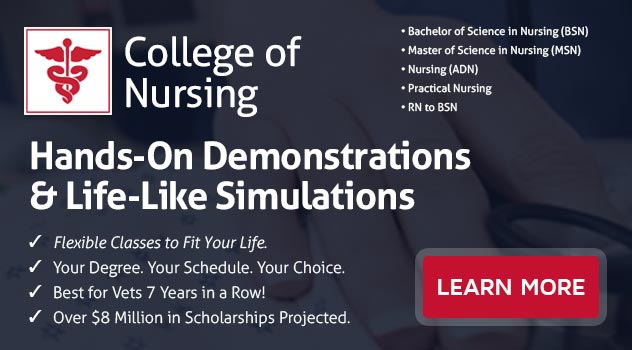Nurse Educator Education Requirements: What Degree do I Need to Teach Nursing?
A nurse educator is a Registered Nurse (RN) who has obtained an advanced degree in nursing which qualifies them to teach at a university or college to prepare the next generation of nurses to enter the profession. As well as imparting academic and technical information, nurse educators:
- Design, implement, evaluate, and revise academic and continuing education programs for nurses
- Serve as role models for nursing students
- Provide leadership for the implementation of evidence-based nursing practice
What is evidence-based nursing practice?
Evidence-based clinical practice draws from high-quality published research. The gold standard of evidence-based medicine is the randomized controlled trial, in which subjects are randomly assigned to intervention and control groups.
Another form of high-quality evidence comes from meta-analyses, or systematic reviews, of randomized controlled trials. A systematic review collates and evaluates the designs, methodologies, and results of clinical studies that have been conducted to answer a focused question.
A third source of quality evidence is found in Clinical Practice Guidelines, which are derived from rigorous analyses of the best evidence available.
Examples of evidence-based medicine in nursing practice include:
- Infection control - Hospitals are breeding grounds for patients developing infections that they wouldn't get outside the hospital environment. Practices such as hand-washing, personal protective clothing, barrier precautions, and keeping the healthcare environment clean are all based on published results of scientific research.
- The use of oxygen in patients with COPD - Conventional wisdom once dictated that these patients not receive oxygen because some clinical professionals believed it would lead to negative outcomes such as acidosis, hypercarbia, or death. Now, based on evidence from clinical studies, patients receive oxygen because it reduces hypoxia, and organ failure, improves quality of life and helps them to live longer.
- IV catheter size and administration of blood - Smaller gauge catheters improve patient comfort when delivering packed red blood cell transfusions (PRBC).
- Non-invasive assessment of blood pressure in children - Research has shown that taking children's blood pressure should be accomplished using a different methods from adults.
Why does a nurse educator need to obtain an MSN before teaching?
As an RN, you will already have completed a bachelor's degree in nursing. After that, it generally takes another two years (or less if you choose an accelerated program) to complete an MSN. The coursework of a master's degree focuses on educational technology, teaching strategies, research methods, and curriculum development. Students are also expected to complete a teaching practicum.
University and college nursing training programs employ both clinical and teaching professionals onto their faculties. Teaching faculty operate in the classroom environment and impart knowledge on topics like medical terminology, pharmacology, or nursing history. Other nurse educators provide online instruction.
Clinical teaching staff supervise and evaluate nursing students in the hospital setting, schools, or community centers. They teach students how to care for patients, correctly document cases, and operate various pieces of medical equipment.
How does this program prepare nurse educators for teaching the next generation of nurses?
A Master's of Science in Nursing (MSN) Degree program with a concentration in nursing education extends the knowledge and skills of registered nurses who have matriculated through a bachelor's degree and prepares them to advance their careers by applying scientific principles and academic skills.
Graduates with an education MSN will be suitable for roles as patient educators; nursing faculty at associate, practical, or degree levels; directors of staff development or professional practice, or clinical nurse educators.
Upon completion of an MSN in nurse education, a graduate should know how to:
- Apply knowledge of finance, regulatory environments, and health care policy to the provision of safe, high quality healthcare.
- Combine the best available evidence with nursing theories, patient education, together with management, leadership, ethical and legal principles, to deliver optimum quality care with compassion.
- Communicate effectively using verbal, written, and electronic methods.
- Draw from a multiplicity of sources to prevent disease, promote health and wellness, and influence the delivery of healthcare. Such sources might include knowledge from the arts and letters, humanities, natural and social sciences in addition to clinical judgement.
Getting started today
Are you an RN looking to advance you career? If you want to teach the next generation of nurses how to use evidence-based practices in their own careers, consider earning a Master of Science in Nursing Degree (MSN) from ECPI University. With completely online classes you could continue to work while fulfilling your career goals. For more information, connect with a friendly ECPI University admissions counselor today.
It could be the Best Decision You Ever Make!
DISCLAIMER – ECPI University makes no claim, warranty, or guarantee as to actual employability or earning potential to current, past or future students or graduates of any educational program we offer. The ECPI University website is published for informational purposes only. Every effort is made to ensure the accuracy of information contained on the ECPI.edu domain; however, no warranty of accuracy is made. No contractual rights, either expressed or implied, are created by its content.
Gainful Employment Information – Master of Science in Nursing
For more information about ECPI University or any of our programs click here: http://www.ecpi.edu/ or http://ow.ly/Ca1ya.





